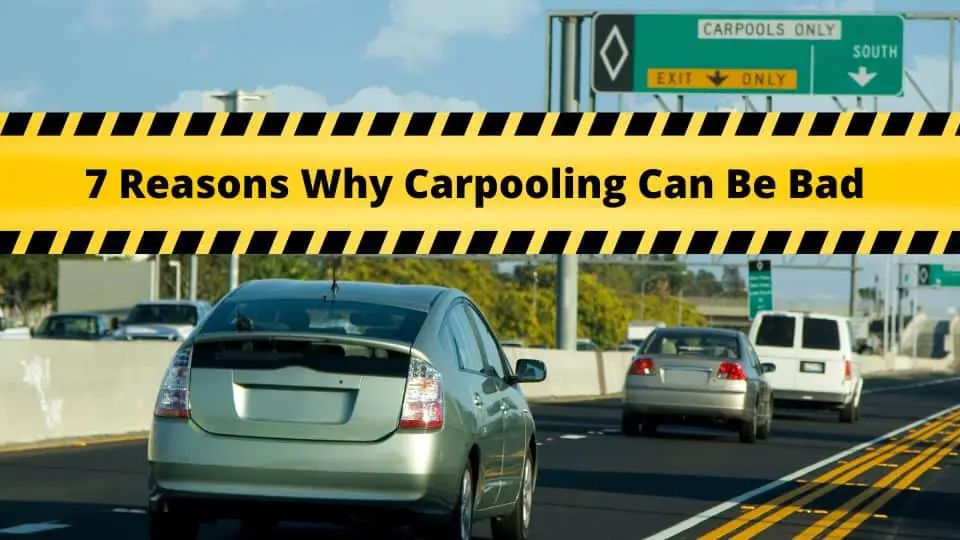This post contains affiliate links.
Many governments and municipal authorities tout Carpooling as a panacea solution to commuters traveling difficulties. Unfortunately, in many instances, the reality is very different.
While carpooling was originally sold to the commuting public on the back of the seven main benefits to the carpoolers, the reality is that there are many disadvantages to carpooling and also may compromises which must be made by members of each carpool group.
The 7 Primary Reasons Why Carpooling Is Bad:
- It won’t always save the carpooler money.
- It isn’t better for the environment.
- There isn’t a health benefit.
- It doesn’t relieve stress.
- It isn’t Convenient
- It doesn’t improve your commuting options
1. It Won’t Always Save The Carpooler Money
Instead of having to drive a car every day and pay for gas, new tires, and servicing, each carpooler is only responsible for the costs on the day their car is being used.
If there are four people in the scheme, the effect should be that the carpooler saves 75% of costs.
While this argument may have some truth, the reality is that with soaring gas prices, the cost savings from carpooling compared to the costs of mass transport methods (bus and trains) begin to swing away from carpooling.
Comparing gas and electricity prices in most cities, the ratio is swinging heavily in favor of electric vehicles, even if the car carries only one person.
2. It Isn’t Better For The Environment
With more people sharing cars, the implication is that fewer cars are on the road and, therefore, fewer carbon emissions.
The reality is that there are better, more environmentally friendly ways to travel including.
Busses Are Greener Then Carpooling
While the bus as a unit produces more carbon emissions than a car, if the number of bus passengers is divided against the buss's carbon footprint, the per passenger cost is lower than an individual car.
This calculation is further improved in cities where electric buses or trams are run.
Trains Are Greener Than Carpooling
The same argument for busses applies to trains as most inner-city trains are electrically powered, and the fact that each carriage can hold large numbers of people weighs in favor of trains.
Electric Cars (EVs) Are Greener That Carpooling
While some members of a carpooling group ay an EV have, it is unlikely that all the participants do.
Five EVs traveling separately is a more environmentally friendly solution than one internal combustion-powered car carrying five people.
3. There Isn’t A Health Benefit
With the carpooler sharing driving duties, they will be able to drive on fewer days. In cities with congested traffic, this is supposed to reduce the carpooler's stress levels.
This argument may have a seed of truth; however, certain aspects of carpooling are not good for your health/stress levels.
- If the other drivers are reckless, ineffective, or just bad, it becomes very difficult to sit back and relax.
- Being in a carpool means you rely on other people's schedules holding up, and if the driver is delayed for any reason, the carpooler is left stranded.
- Carpooling means you are not in your car, with your own rules, and therefore you cannot relax completely.
4. It Doesn’t Relieve Stress
Being a passenger, sitting back, and watching the scenery go by is supposed to be a stress release. If the carpooler is not on driver duty, they may be able to do the following.
- Finish office work.
- Read a book.
- Watch YouTube videos.
- Check their social media.
- Talk on a cell phone.
- Or any other activity which they would not do if driving.
This argument may hold up if the carpool members are like-minded individuals; however, if they are not, it is very easy for friction to be created, making the commute a nightmare.
Traveling by train or bus offers many stress relief benefits that carpooling cannot.
5. It Isn’t Convenient
Carpooling was promised to be convenient because it was intended to be a commuting arrangement with other people who live a short distance from each other.
Carpooling is only convenient if every group member has the same schedule; as soon one member becomes tardy or there is a delay or cancellation, the benefit of carpooling vanishes.
6. It Doesn’t Improve Your Commuting Options
Carpooling adds to the commuting options which are available to the commuter. However, many traveling options the commuter has; when joining a carpool, one more is added to the mix.
While it is true that carpooling provides more traveling options, if the carpooling schedule is disrupted and the carpooler does not have the resources to take public transport, they quickly run out of options.
7. It’s Not A Way To Make New Friends
The seventh benefit of carpooling is that it introduces the carpooler to new people, and friendships may form.
While this may be true sometimes, the reality is that if you put four or more disparate people in the same car twice a day for five days a week, there is not a great deal of chance that friendships will be made.
There will naturally be differences relating to politics, religion, emigration, the economy, or any of the many other topics on which people hold strong views.
Different Types Of Carpooling
With the introduction of different technologies, the definition of carpooling is being expanded.
Traditional Carpooling
While traditional carpooling relies on people who live in the same area, entering into an arrangement where each member provides their vehicle for specific days of the week. On the other days, the members drive in the other member's vehicles.
Real-Time Carpooling
Real-time carpooling is presented under a different name, including “app-based carpooling” and “dynamic carpooling.”
These systems enable people to coordinate ad hoc rides on-demand. They use smartphone apps or real-time websites that work similarly to ride sharing apps.
The apps enable each party to arrange the time, pick up points, and agree on the cost of the journey.
Vanpooling
Vanpooling works similarly, except one group member provides the van, and the costs of running the van are shared.
Conclusion
In principle, carpooling makes a lot of sense and should have achieved the benefits predicted when the concept was originally proposed. Times have changed, people have become more individualistic, transport technology has evolved, and carpooling has become less effective than other forms of transport.


